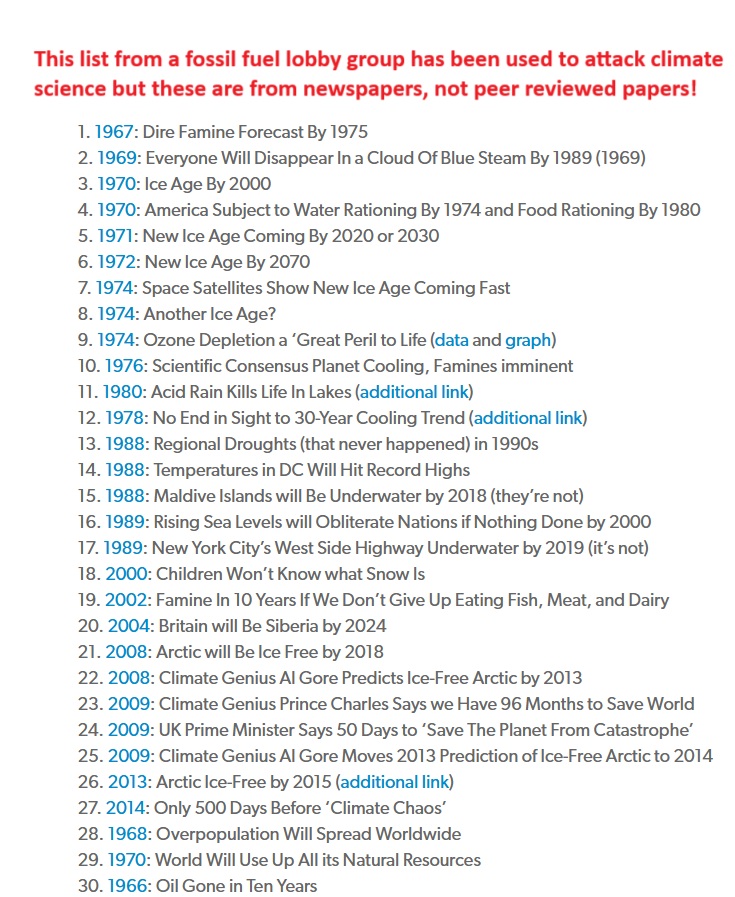
Anon Science Comms. I debunk human induced climate change denial. bsky : https://t.co/vhHHkJhajB Opinions mine, facts from scientists.
How to get URL link on X (Twitter) App


 She posts misleading content on X and instagram among other platforms. Example : her graph is fake as shown by checking the actual NOAA dataset observations for that region. Also its a cherry pick. Global temps climate models match observations well.
She posts misleading content on X and instagram among other platforms. Example : her graph is fake as shown by checking the actual NOAA dataset observations for that region. Also its a cherry pick. Global temps climate models match observations well. 


 1. 1967: Dire Famine Forecast By 1975
1. 1967: Dire Famine Forecast By 1975
 1) Braemar has had weather stations for a very long time. One of the newer ones is just 400m outside town. It isn't "missing" as falsely claimed, you can find it on google maps
1) Braemar has had weather stations for a very long time. One of the newer ones is just 400m outside town. It isn't "missing" as falsely claimed, you can find it on google maps 

 Chris Martz cites many people as his inspiration most of which are known to mislead 1) Tony Heller; Tony is a Sandy Hook conspiracy theorist who misquotes people, hides data or uses deceptive techniques to fool non specialists. Heller caught out here:
Chris Martz cites many people as his inspiration most of which are known to mislead 1) Tony Heller; Tony is a Sandy Hook conspiracy theorist who misquotes people, hides data or uses deceptive techniques to fool non specialists. Heller caught out here: https://x.com/TheDisproof/status/1782841996614250829

 Their paper falsely claims “. Sea level rise is currently a very modest two millimeters per year”. They cite their own non peer reviewed source (A clintel climate denial “report”) but omit that both tide gauges AND satellite data shows a faster rate and an accelerating rate.
Their paper falsely claims “. Sea level rise is currently a very modest two millimeters per year”. They cite their own non peer reviewed source (A clintel climate denial “report”) but omit that both tide gauges AND satellite data shows a faster rate and an accelerating rate. 

https://x.com/TheDisproof/status/1633492932484374530

 2) They say "climate has always changed" but ignore the key context a) Our emissions have accelerated the rate to a harmful level b) the longer we take to reach net zero = higher cost c) Net zero slows the rate down to safer levels. See and then...ox.ac.uk/news/2022-09-1…
2) They say "climate has always changed" but ignore the key context a) Our emissions have accelerated the rate to a harmful level b) the longer we take to reach net zero = higher cost c) Net zero slows the rate down to safer levels. See and then...ox.ac.uk/news/2022-09-1…


 NOAA changed the network it uses to nClimDiv & a pristine sited, automated, network called the USCRN (U.S. Climate Reference Network). John cherry picked stations from an old network (called USHCN) which is no longer used by NOAA. ncei.noaa.gov/access/metadat…
NOAA changed the network it uses to nClimDiv & a pristine sited, automated, network called the USCRN (U.S. Climate Reference Network). John cherry picked stations from an old network (called USHCN) which is no longer used by NOAA. ncei.noaa.gov/access/metadat…
https://twitter.com/kevpluck/status/1667842334762074114?s=203) On sea level, the longer we emit, the longer it takes to stop rising. The rate slows if we reduce emissions. Also
https://twitter.com/TheDisproof/status/1663451003004264448?s=20
https://twitter.com/TalkTV/status/1667844055160553472In addition ox.ac.uk/news/2022-09-1… "Transitioning to a decarbonised energy system by around 2050 is expected to save the world at least $12 trillion, compared to continuing our current levels of fossil fuel use"